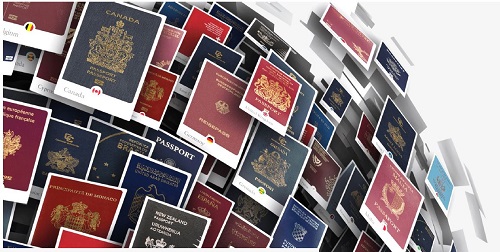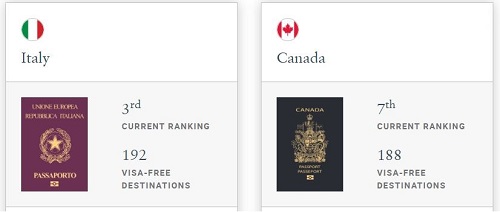Passports: Singapore the best, Italy’s third and Canada seventh; down US, up China
TORONTO – The most “powerful” passport in the world is Singapore’s, the only one that allows entry into 195 countries (out of a total of 227) without any prior Visa; Italy, which until last year shared this record with Singapore and Japan, France, Germany and Spain, falls to third place “losing” two countries (from 194 last year to 192 this year). But things are worse for Canada which, with 188 “Visa-free” countries, remains seventh, a position where it has fallen for some years after being, in 2014 (one year before the beginning of the Trudeau-era), in second place.
The data are from the Henley Passport Index: the chart, elaborated using official data from the International Air Transport Association (IATA), for almost twenty years (to be precise since 2006) has classified the most powerful passports in the world, based on the number of countries accessible without a prior Visa (to be distinguished from the ETA, Electronic Travel Authorization, which is just a sort of “check in”).
Therefore, the 2025 ranking (you can see it here in its web version or download it as .pdf clicking here: Henley Passport Index 2025 January Global Ranking) sees Singapore add a country and remain alone at the top with 195 countries, Japan in second with 193 (lost one) and then, in third place, Italy together with Finland, France, Spain, Germany and South Korea with 192 countries. Austria, Denmark, Ireland, Luxembourg, the Netherlands, Norway and Sweden (191) follow in fourth place; Belgium, New Zealand, Portugal, Switzerland and the United Kingdom (190) in fifth place; Australia and Greece (189) in sixth; Canada, Malta and Poland (188) in seventh; Hungary and the Czech Republic (187) in eighth; Estonia and the United States (186) in ninth; Lithuania, Latvia, Slovenia and the United Arab Emirates (185) in tenth.
The United States’ “performance” is, together with Canada’s, among the worst in recent years: in the last decade, the US has in fact fallen from second to ninth place in the ranking. Only Venezuela has done worse, falling from 30th to 45th place in ten years. Annie Pforzheimer, senior associate at the Washington Center for Strategic and International Studies think tank, argues – writes Forbes.it, here – that the US’s decline is attributable to the country’s ‘America First’ stance. “Even though U.S. economic health – says Pforzheimer – relies heavily on immigration, tourism, and trade, voters, during the 2024 presidential campaign were fed a narrative that America can (and should) stand alone. Ultimately, if tariffs and deportations are the Trump administration’s default policy tools, not only will the U.S. continue to decline on the mobility index on a comparative basis, but it will probably do so in absolute terms as well. This trend in tandem with China’s greater openness will likely give rise to Asia’s greater soft power dominance worldwide” …and in fact, China is one of the countries that “climbs” the most in the special passport ranking, going from 94th place in 2015 to 60th in 2025 with its Visa-free score growing by 40 destinations. And China is also one of the “Visa-free” destinations for Italians. This is not the case for Canadians, who, unlike Italians, need a Visa to enter not only China but also Iran, Venezuela and Vietnam.
Finally, at the bottom of the list, we find Afghanistan, which has a passport that allows entry to only a limited number of destinations: just 26. In comparison, Singaporeans can travel to 169 more destinations without a Visa, than Afghan passport holders: it’s the “largest mobility gap” in the 19-year history of the Henley Passport Index.
In the graphics above: the situations of the two passports, Italian and Canadian, in the Henley Index and the main pic of the chart (from https://www.henleyglobal.com)




